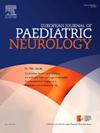Fulfilling the needs of caregivers in delivering health services to children with developmental and epileptic encephalopathies
IF 2.3
3区 医学
Q3 CLINICAL NEUROLOGY
引用次数: 0
Abstract
Introduction
Patients with developmental and epileptic encephalopathies (DEEs) have multiple comorbidities and high healthcare needs. Whether health services meet the needs of this patient population and their families is not well understood. We explored caregiver perspectives on their child's health service use, satisfaction with health services, and priorities for improvement.
Methods
Caregivers of patients with DEEs completed online questionnaires containing specifically designed quantitative and qualitative questions to assess their perceptions of their child's health service use over a 12-month period. We analysed the quantitative data using descriptive and non-parametric statistics and the qualitative data using content analysis.
Results
Seventy-five caregivers participated. Over 12-months, 52 (69.3 %) patients presented to the emergency department, 70 (93.3 %) saw ≥3 medical professionals, and 45 (60 %) saw ≥3 allied health professionals (n = 45, 60.0 %). Caregivers were satisfied with their child's healthcare when they perceived healthcare professionals to be compassionate and knowledgeable. Caregivers were dissatisfied when they perceived that healthcare professionals were not knowledgeable about DEEs, or they felt unheard, unsupported, needed to advocate for their child's healthcare and disability funding, and perceived care coordination to be lacking. Hospital care and parent psychological support were caregivers' top priorities for improvement to the healthcare system.
Discussion
Care coordination and access to knowledgeable healthcare professionals and psychological supports should be prioritised to achieve more appropriate models of care for patients with DEEs. Further research should evaluate models of care which incorporate these features to determine if they provide high value healthcare and improve the patient and family journey.
满足照顾者在向患有发育性和癫痫性脑病的儿童提供保健服务方面的需要
发展性和癫痫性脑病(dei)患者有多种合并症和高保健需求。卫生服务是否能满足这一患者群体及其家属的需求尚不清楚。我们探讨了照顾者对其孩子使用卫生服务、对卫生服务的满意度和需要优先改进的方面的看法。方法di患者的护理提供者完成了包含专门设计的定量和定性问题的在线问卷,以评估他们对孩子在12个月内使用卫生服务的看法。我们使用描述性和非参数统计来分析定量数据,使用内容分析来分析定性数据。结果75名护理人员参与调查。在12个月内,52例(69.3%)患者就诊于急诊科,70例(93.3%)就诊于≥3名医疗专业人员,45例(60%)就诊于≥3名联合医疗专业人员(n = 45, 60.0%)。当照顾者认为医疗保健专业人员富有同情心和知识渊博时,他们对孩子的医疗保健感到满意。当护理人员认为医疗保健专业人员不了解残疾患者,或者他们感到闻所未闻,没有得到支持,需要倡导他们孩子的医疗保健和残疾资金,并且认为缺乏护理协调时,护理人员会感到不满。医院护理和家长心理支持是护理人员改善医疗保健系统的首要任务。讨论应优先考虑护理协调和获得知识渊博的医疗保健专业人员和心理支持,以实现更合适的护理模式的病人的学位。进一步的研究应该评估包含这些特征的护理模式,以确定它们是否提供高价值的医疗保健,并改善患者和家庭的旅程。
本文章由计算机程序翻译,如有差异,请以英文原文为准。
求助全文
约1分钟内获得全文
求助全文
来源期刊
CiteScore
6.30
自引率
3.20%
发文量
115
审稿时长
81 days
期刊介绍:
The European Journal of Paediatric Neurology is the Official Journal of the European Paediatric Neurology Society, successor to the long-established European Federation of Child Neurology Societies.
Under the guidance of a prestigious International editorial board, this multi-disciplinary journal publishes exciting clinical and experimental research in this rapidly expanding field. High quality papers written by leading experts encompass all the major diseases including epilepsy, movement disorders, neuromuscular disorders, neurodegenerative disorders and intellectual disability.
Other exciting highlights include articles on brain imaging and neonatal neurology, and the publication of regularly updated tables relating to the main groups of disorders.

 求助内容:
求助内容: 应助结果提醒方式:
应助结果提醒方式:


